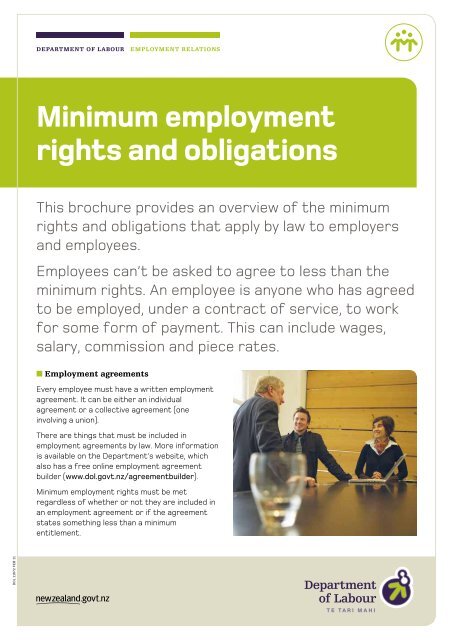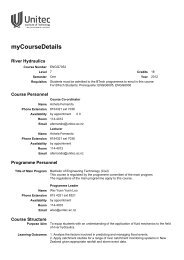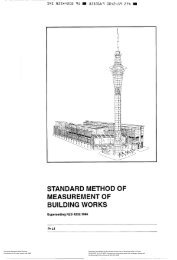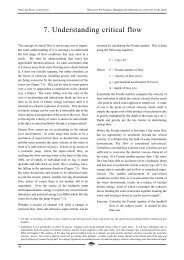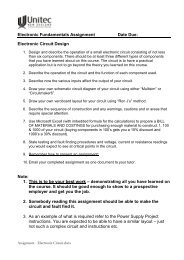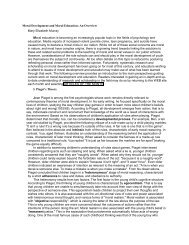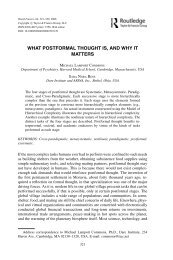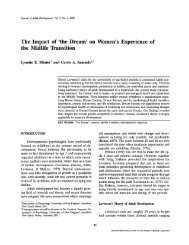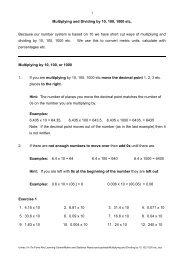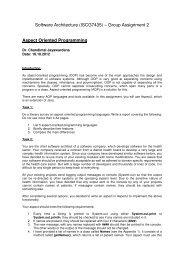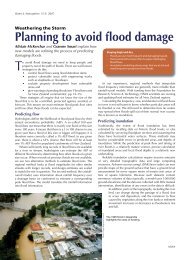Minimum employment rights and obligations
Minimum employment rights and obligations
Minimum employment rights and obligations
Create successful ePaper yourself
Turn your PDF publications into a flip-book with our unique Google optimized e-Paper software.
DEPARTMENT OF LABOUR EMPLOYMENT RELATIONS<br />
<strong>Minimum</strong> <strong>employment</strong><br />
<strong>rights</strong> <strong>and</strong> <strong>obligations</strong><br />
This brochure provides an overview of the minimum<br />
<strong>rights</strong> <strong>and</strong> <strong>obligations</strong> that apply by law to employers<br />
<strong>and</strong> employees.<br />
Employees can’t be asked to agree to less than the<br />
minimum <strong>rights</strong>. An employee is anyone who has agreed<br />
to be employed, under a contract of service, to work<br />
for some form of payment. This can include wages,<br />
salary, commission <strong>and</strong> piece rates.<br />
■ Employment agreements<br />
Every employee must have a written <strong>employment</strong><br />
agreement. It can be either an individual<br />
agreement or a collective agreement (one<br />
involving a union).<br />
There are things that must be included in<br />
<strong>employment</strong> agreements by law. More information<br />
is available on the Department’s website, which<br />
also has a free online <strong>employment</strong> agreement<br />
builder (www.dol.govt.nz/agreementbuilder).<br />
<strong>Minimum</strong> <strong>employment</strong> <strong>rights</strong> must be met<br />
regardless of whether or not they are included in<br />
an <strong>employment</strong> agreement or if the agreement<br />
states something less than a minimum<br />
entitlement.<br />
DOL 11672 FEB 11
■ Right to work in New Zeal<strong>and</strong><br />
Employers must ensure that the person they<br />
are employing has the legal right to work in<br />
New Zeal<strong>and</strong>. The Department’s VisaView tool<br />
allows employers to confirm information about<br />
employees’ work entitlement.<br />
See www.immigration.govt.nz/visaview<br />
■ <strong>Minimum</strong> pay<br />
The adult minimum wage must be paid to<br />
employees aged 16 years <strong>and</strong> over, who are not<br />
new entrants or trainees:<br />
››<br />
New entrants are 16 <strong>and</strong> 17 year olds who<br />
have been employed for less than 200 hours<br />
or three months; who are not supervising<br />
or training other workers; <strong>and</strong> who are not<br />
trainees.<br />
››<br />
Trainees are employees aged 16 or over who<br />
are required by their <strong>employment</strong> agreements<br />
to undertake at least 60 credits a year in a<br />
registered training programme.<br />
<strong>Minimum</strong> pay rates must be paid to all employees<br />
whether full-time, part-time fixed-term, casual<br />
employees, working from home <strong>and</strong> people paid<br />
totally or partly by commission or piece rates.<br />
There is no minimum wage for employees aged<br />
under 16 but all other <strong>employment</strong> <strong>rights</strong> <strong>and</strong><br />
entitlements still apply.<br />
<strong>Minimum</strong> pay rates are reviewed each year<br />
<strong>and</strong> the current amounts are available on the<br />
Department’s website.<br />
■ Paying wages<br />
Legally wages must be paid in cash. To pay wages<br />
another way (e.g. direct credit, cheque) employers<br />
must get their employees written agreement.<br />
Employees must give written consent before<br />
deductions can be made from their wages. Some<br />
deductions, like PAYE tax, student loan <strong>and</strong> child<br />
support, are required by law <strong>and</strong> do not need<br />
written consent.<br />
■ Keeping records<br />
Employers must keep an accurate record of an<br />
employee’s time worked, payments, <strong>and</strong> holiday<br />
<strong>and</strong> leave entitlements. They must keep a signed<br />
copy of the <strong>employment</strong> agreement or current<br />
signed terms <strong>and</strong> conditions, <strong>and</strong> must provide a<br />
copy on request to the employee.<br />
They should also keep copies of agreements to<br />
transfer public holidays or agreements to cash up<br />
annual holidays or copies of requests to transfer<br />
public holidays or request to cash up annual<br />
holidays that the employer did not agree to.<br />
For details on what information must be recorded<br />
see the Department’s website.<br />
■ Break entitlements<br />
Employees are entitled to:<br />
››<br />
one 10-minute paid rest break when they work<br />
between two <strong>and</strong> four hours<br />
››<br />
one 10-minute paid rest break <strong>and</strong> one unpaid<br />
30-minute meal break when they work more<br />
than four <strong>and</strong> up to six hours<br />
››<br />
two 10-minute paid rest breaks <strong>and</strong> one<br />
unpaid 30-minute meal break when they work<br />
more than six <strong>and</strong> up to eight hours.<br />
These requirements begin over again if an<br />
employee works more than eight hours.<br />
Employers must provide appropriate breaks <strong>and</strong><br />
facilities for employees with babies who wish to<br />
breastfeed or express breast milk, where this<br />
is reasonable <strong>and</strong> practicable. These are unpaid<br />
breaks unless the employer agrees otherwise.<br />
DEPARTMENT OF LABOUR<br />
MINIMUM EMPLOYMENT RIGHTS AND OBLIGATIONS
Holidays & Leave<br />
■ Annual holidays<br />
At the end of each year of <strong>employment</strong> with<br />
any one employer, an employee becomes<br />
entitled to four weeks’ paid annual holidays.<br />
Employees can ask (in writing) to cash-up,<br />
up to one week of their annual holidays each<br />
year. Employers can’t pressure employees<br />
to cash up annual holidays <strong>and</strong> requests to<br />
cash up can’t be included in <strong>employment</strong><br />
agreements.<br />
If an employee leaves before completing a full<br />
year of <strong>employment</strong>, annual holiday pay would<br />
be 8% of their gross earnings, less any holiday<br />
pay already received.<br />
Genuinely casual employees (those who work<br />
intermittently) <strong>and</strong> fixed term employees<br />
can agree to receive holiday pay on a “pay as<br />
you go basis” if certain conditions are met.<br />
See the Department’s website for more<br />
information.<br />
Employers can require employees to take<br />
annual holidays during a closedown period<br />
(as can happen over Christmas/New Year),<br />
providing they give at least 14 days’ notice.<br />
If an employer has a closedown period that<br />
includes public holidays, then the employee is<br />
entitled to paid public holidays if they would be<br />
otherwise working days for them.<br />
■ Public holidays<br />
Employees are entitled to 11 public holidays off<br />
work on pay, if they are days when the employee<br />
would normally work. Employers must pay<br />
employees their relevant daily pay or average<br />
daily pay (if applicable) for the public holiday.<br />
If an employee works on a public holiday they<br />
must be paid at least time-<strong>and</strong>-a-half for the<br />
time worked. If the public holiday falls on a day<br />
they would normally work, the employee is also<br />
entitled to an alternative paid holiday.<br />
Employers <strong>and</strong> employees can agree to<br />
transfer the observance of a public holiday<br />
to another working day, to meet the needs of<br />
the business or individual employees. However,<br />
the number of public holidays the employee<br />
is entitled to can’t be reduced. The day the<br />
public holiday is transferred to is treated as a<br />
public holiday for pay <strong>and</strong> leave purposes.<br />
The Department’s website has a list of public<br />
holidays <strong>and</strong> the Holidays & Leave Tool makes<br />
it easy to work out pay <strong>and</strong> leave entitlements.<br />
(www.dol.govt.nz/holidaytool)<br />
■ Sick <strong>and</strong> bereavement leave<br />
After six months an employee is entitled to<br />
five days sick leave on pay. They are entitled to<br />
five days sick leave for every 12 months after<br />
that. Sick leave can be taken if the employee<br />
is sick or injured or the employee’s spouse or<br />
partner is sick or injured or if a person who<br />
depends on the employee for care is sick or<br />
injured.<br />
Employers must pay employees their relevant<br />
daily pay or average daily pay (if applicable) for<br />
sick leave.<br />
Employers can request proof of the illness,<br />
such as a medical certificate. If the employer<br />
asks for proof within the first three days of<br />
the sick leave, the employer is responsible for<br />
any costs the employee might incur to gain<br />
this proof. Employers can’t insist employees<br />
visit a particular medical practitioner.<br />
After six months employees are entitled to<br />
paid bereavement leave of:<br />
››<br />
three days on the death of a spouse/<br />
partner, parent, child, sibling, gr<strong>and</strong>parent,<br />
gr<strong>and</strong>child, or spouse/partner’s parent<br />
››<br />
one day if their employer accepts they’ve<br />
suffered a bereavement involving another<br />
person not included above.<br />
The Holidays & Leave Tool can help<br />
calculate sick leave <strong>and</strong> bereavement leave<br />
entitlements.<br />
DEPARTMENT OF LABOUR<br />
MINIMUM EMPLOYMENT RIGHTS AND OBLIGATIONS
■ Flexible working arrangements<br />
■ Parental leave<br />
Employees may be eligible for paid <strong>and</strong> unpaid<br />
parental leave if they meet certain criteria.<br />
The paid leave is funded by Government, not<br />
employers.<br />
Employees may be entitled to parental leave if<br />
they have worked for the same employer for an<br />
average of at least 10 hours per week, <strong>and</strong> at<br />
least one hour in every week or 40 hours in every<br />
month, for either the six or 12 months before<br />
the expected due date of their baby or the date<br />
they assume care of a child they intend adopting.<br />
Employees who meet the six-month <strong>employment</strong><br />
eligibility criteria are entitled to 14 weeks’ paid<br />
parental leave – some or all of which can be<br />
transferred to a spouse/partner if they also<br />
meet the six month criteria.<br />
Employees who meet the 12-month eligibility<br />
criteria, are also entitled to up to 52 weeks’<br />
unpaid extended leave (less any parental leave<br />
taken). This can be shared with a spouse/partner<br />
if they also meet the 12-month eligibility criteria.<br />
A spouse/partner with six months’ service may<br />
be entitled to an additional one weeks’ unpaid<br />
paternity/partner’s leave, <strong>and</strong> a spouse/partner<br />
with 12 months’ service may be entitled to two<br />
weeks’ unpaid paternity/partner’s leave. To be<br />
eligible, the spouse/partner must meet the<br />
minimum hours test above.<br />
Up to 10 days’ unpaid special leave for<br />
pregnancy-related reasons is available for a<br />
pregnant mother before parental leave begins.<br />
For help underst<strong>and</strong>ing entitlement to parental<br />
leave, or what to do with an application from an<br />
employee, see the Department’s website. The<br />
Parental Leave Calculator www.dol.govt.nz/<br />
paidparental can calculate entitlements.<br />
■ Other leave <strong>rights</strong><br />
Employees may be entitled to other types of<br />
leave, for example if they’ve been injured in a work<br />
accident or are training in the armed forces.<br />
Employees with caring responsibilities have a<br />
statutory right to request a change to their<br />
hours of work, days of work, or place of work.<br />
Employers must consider a request <strong>and</strong> can<br />
refuse it only on certain grounds. See www.dol.<br />
govt.nz/worklife for more information.<br />
■ Equal pay <strong>and</strong> equal <strong>rights</strong><br />
Employers can’t discriminate in hiring or firing,<br />
paying, training or promoting an employee<br />
because of race, colour, national or ethnic<br />
origin, sex or sexual orientation, marital or family<br />
status, <strong>employment</strong> status, age, religious belief<br />
or political opinion, disability, or participation in<br />
certain union activities.<br />
■ Fixed-term employees<br />
Employers can offer fixed-term <strong>employment</strong> if:<br />
››<br />
there are genuine reasons - like seasonal<br />
work, project work, or where the employee is<br />
filling in for a permanent employee on leave<br />
››<br />
the employer tells the employee the reasons,<br />
how or when the <strong>employment</strong> will end,<br />
<strong>and</strong> the employee agrees to this in their<br />
<strong>employment</strong> agreement.<br />
Like other <strong>employment</strong> agreements, fixed-term<br />
agreements must be in writing.<br />
■ Trial periods<br />
Employers can make an offer of <strong>employment</strong><br />
that includes a trial period of up to 90 days. Trial<br />
periods are voluntary, <strong>and</strong> must be agreed in<br />
writing <strong>and</strong> negotiated in good faith as part of<br />
the <strong>employment</strong> agreement.<br />
An employee who is dismissed before the end of<br />
a trial period can’t raise a personal grievance on<br />
the grounds of unjustified dismissal. They can<br />
raise a personal grievance on other grounds,<br />
such as discrimination or harassment or<br />
unjustified action by the employer.<br />
Employees on trial periods are entitled to all<br />
other minimum <strong>employment</strong> <strong>rights</strong>.<br />
DEPARTMENT OF LABOUR<br />
MINIMUM EMPLOYMENT RIGHTS AND OBLIGATIONS
■ Change <strong>and</strong> restructuring<br />
■ Unions<br />
Employees have the right to decide whether to<br />
join a union <strong>and</strong>, if so, which union. It is illegal for<br />
an employer (or anyone else) to put unreasonable<br />
pressure on an employee to join or not join a union.<br />
Once employees have joined a union, employers<br />
must, if asked, enter into bargaining for a<br />
collective agreement with that union.<br />
Union members can attend two union meetings<br />
(no longer than two hours each) per calendar year<br />
on pay <strong>and</strong> during normal working hours. They<br />
can require employers to deduct union fees from<br />
their wages <strong>and</strong> pay these to the union. Some<br />
members may be entitled to paid leave to attend<br />
<strong>employment</strong> relations education courses.<br />
Unions must gain an employer’s consent to visit<br />
a workplace. The employer can’t unreasonably<br />
withhold consent.<br />
See the Department’s website for more<br />
information on unions <strong>and</strong> collective bargaining,<br />
including strikes <strong>and</strong> lockouts.<br />
■ Health <strong>and</strong> safety<br />
Employers must provide a safe workplace, with<br />
proper training, supervision <strong>and</strong> equipment. This<br />
duty includes identifying, assessing <strong>and</strong> managing<br />
hazards, <strong>and</strong> investigating health <strong>and</strong> safety<br />
incidents. Employers are also required to report<br />
serious injuries at work to the Department of<br />
Labour.<br />
Employees must take reasonable care to keep<br />
themselves safe, <strong>and</strong> to avoid causing harm<br />
to other people by the way they do their work.<br />
Employees may refuse work likely to cause them<br />
serious harm <strong>and</strong> have the right to participate in<br />
improving health <strong>and</strong> safety.<br />
Employers must consult with employees about<br />
proposed decisions likely to have an adverse effect<br />
on the continuation of an employee’s <strong>employment</strong>.<br />
They must provide information to affected<br />
employees <strong>and</strong> give them an opportunity to<br />
comment before making their decision. Employers<br />
do not have to disclose confidential information if<br />
they have a good reason to withhold it.<br />
Special rules apply to employees doing certain<br />
catering, cleaning, caretaking, laundry <strong>and</strong> orderly<br />
work where their employer’s business is sold or<br />
their work is contracted out or given to a new<br />
contractor.<br />
■ Employment relationship problems<br />
If an <strong>employment</strong> problem arises at work<br />
employers <strong>and</strong> employees should firstly check the<br />
facts. They should talk to each other to try to<br />
resolve the problem, possibly involving a support<br />
person or union/association representative in the<br />
discussion. They can get information about <strong>rights</strong><br />
<strong>and</strong> <strong>obligations</strong> from the Department.<br />
If the problem can’t be resolved by talking,<br />
employees or employers can contact the<br />
Department of Labour, <strong>and</strong> a Mediator or Labour<br />
Inspector may be able to help sort things out. This<br />
service is free.<br />
Problems that remain unresolved can be taken to<br />
the Employment Relations Authority or later to<br />
the Employment Court.<br />
■ Penalties<br />
There are financial penalties for not complying<br />
with <strong>employment</strong> laws, of up to $10,000 for<br />
individuals <strong>and</strong> $20,000 for companies. An<br />
employer may be fined or prosecuted for not<br />
complying with workplace health <strong>and</strong> safety laws.<br />
DEPARTMENT OF LABOUR<br />
MINIMUM EMPLOYMENT RIGHTS AND OBLIGATIONS
More information<br />
www.dol.govt.nz<br />
0800 20 90 20<br />
Information, examples <strong>and</strong> answers to your<br />
questions about the topics covered here can<br />
be found on our website www.dol.govt.nz or<br />
by calling us free on 0800 20 90 20.<br />
About the Department of Labour<br />
The Department of Labour provides information <strong>and</strong> investigates problems to do with<br />
<strong>employment</strong> <strong>and</strong> workplace health <strong>and</strong> safety. We can help employers <strong>and</strong> employees with:<br />
››<br />
<strong>employment</strong> conditions<br />
››<br />
minimum legal requirements<br />
››<br />
problem resolution<br />
››<br />
health <strong>and</strong> safety<br />
››<br />
ways to work better<br />
››<br />
labour market information.<br />
Disclaimer<br />
This document is a guide only. It should not be used as a substitute for legislation or legal<br />
advice. The Department of Labour is not responsible for the results of any actions taken<br />
on the basis of information in this document, or for any errors or omissions.<br />
ISBN 978-0-478-36080-6<br />
March 2011<br />
DEPARTMENT OF LABOUR<br />
MINIMUM EMPLOYMENT RIGHTS AND OBLIGATIONS


